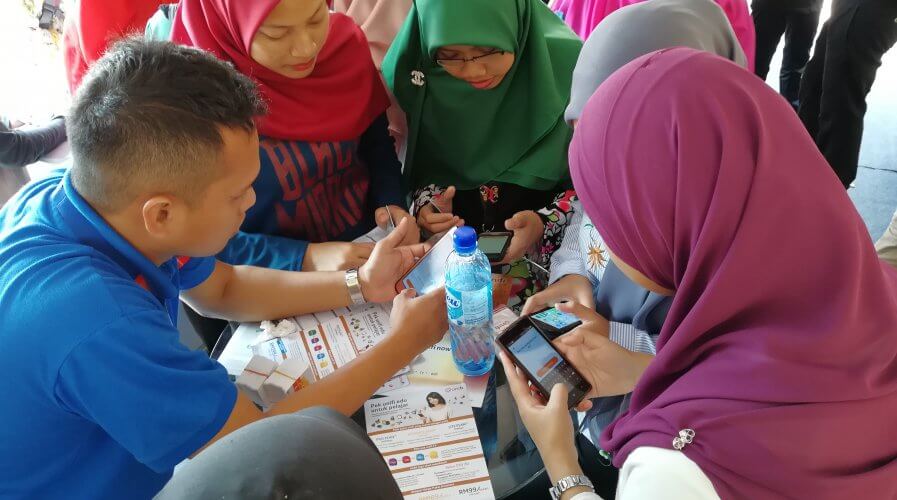
How big of an impact the policies outlined in 2019 Budget have on Malaysia’s digital transformation journey?
2019 Budget: Is Malaysia doing enough to boost its digital transformation?
POLITICAL will and policies are among some of the most crucial determinants of a country’s digital transformation journey.
Malaysia, last Friday, announced a US$720 million “Industry Digitalization Transformation Fund,” in its national 2019 Budget, outlining the country’s ambitions to prepare for the oncoming digital economy.
Finance Minister Lim Guan Eng said the fund is to accelerate the adoption of smart technology which includes automation, robotics, and artificial intelligence (AI).
The fund comes in the shape of financial assistance with a subsidized interest rate of 2 percent.
Lim also announced an allocation of US$50 million to support the transition of enterprises to Industry 4.0, as well as an initiative to carry out a “Readiness Assessment” on first 500 small and medium enterprises (SMEs).
How big of an impact these policies have on Malaysia’s digital transformation journey?
“Significant,” according to Trend Micro Malaysia Sdn Bhd MD, Goh Chee Hoh.
The funding significantly will improve the adoption of Industry 4.0 technologies, which will increase productivity and competitiveness, according to Goh.
“We look forward to the direction that our country is taking and the new economic opportunities being realized from the launch of the Readiness Assessment Programme and the implementation of the Industry Digitalisation Transformation Fund,” he added.
Innovative Solutions
Malaysian Rubber Glove Manufacturers Association (MARGMA) believes that these initiatives will encourage local manufacturers to adopt and invest in automation, robotics, and artificial intelligence.
It gives them the incentive to modernize and upgrade their manufacturing plants the association said, as reported by The Edge Markets.
MARGMA president, Denis Low Jau Foo said that the announcement came at a good time as the Malaysian rubber glove industry is in its second phase of growth — where product innovation and production technology get competitive.
He added, “Heavy investments are required for this phase of growth to maintain our competitive advantage, in light of the growing competition from foreign rubber glove manufacturers.”
Developing human capital
Meanwhile, Cisco Malaysia MD, Albert Chai said that as machine learning and AI becomes mainstream, human capital remains key in driving Industry 4.0.
“Thus, we laud the government’s move to strengthen digital talent and industrial-relevant capabilities by introducing tax incentives for Industry 4.0-related scholarships and training,” said Chai.
Chai said 1.2 million fewer workers are required in 2028 for the same output today, citing a Cisco and Oxford Economics joint study.
The study also revealed that computer and data skills are a new measure of literacy and with that in mind there needs to be a re-thinking of STEM-based education, he added.
Increased Connectivity
Lazada Malaysia CEO Christophe Lejeune lauded the government’s move to slash the fixed-line broadband services price, as well as the US$240 million allocations towards the National Fibre Connectivity Plan – a five-year plan to boost connectivity in the rural areas.
“Rural connectivity is essential to grow the next generation of rural entrepreneurs from previously unconnected areas.
“With this program, we can help uplift more entrepreneurs, increase rural buyers’ access to cheaper online products and in turn improve their welfare, said Lejeune.
Welcoming the digital economy
The new Malaysian government has made progress towards preparing the nation to become a fully digital economy, said Gartner Inc research VP, Tervinderjit Singh.
According to Gartner’s 2018 CIO Agenda, CIOs list the lack of talent and skill shortage as one of the main barriers to digital transformation within organizations.
The Malaysian government’s allocation of US$50 million to assist businesses to migrate to Industry 4.0 through the “Readiness Assessment Programme” reaffirms its commitment to upskilling the workforce, and Singh believes that this move is a step in the right direction.
SMEs also want to digitize but are often hindered in their transformation journey due to scarce resources, and Gartner welcomes government’s pledge of financial assistance to these organizations.
Singh said, “This assistance if channeled and utilized properly is a positive step towards driving Industry 4.0 in Malaysia and supporting SMEs as they continue embracing digital transformation.
With internet penetration at its highest among all counties in the region, Malaysia is well positioned for a digital transformation.
The continued political will, strategic policies, and unified vision, therefore, might just provide the fillip needed to propel the economy to a new high.
READ MORE
- Strategies for Democratizing GenAI
- The criticality of endpoint management in cybersecurity and operations
- Ethical AI: The renewed importance of safeguarding data and customer privacy in Generative AI applications
- How Japan balances AI-driven opportunities with cybersecurity needs
- Deploying SASE: Benchmarking your approach






